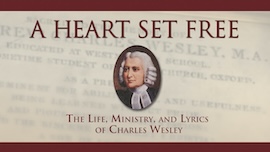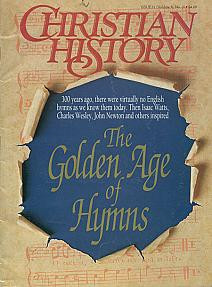Charles Wesley Was Filled with the Holy Spirit

Like his brother John, he was an active evangelist, but he is better known for his hymns.
HE HAD JUST BEEN to the American colonies on a mission trip. Yet Charles Wesley was consumed by a deep spiritual void. Although he had been involved in evangelism, spiritual disciplines, and good works for many years, he lacked the joy described in the New Testament and felt no inner witness that he was God’s child. Instead, he often had doubts of his salvation and was sometimes overcome by sin.
Wesley had been ordained in 1735, under pressure from his older brother John. But his failures and anxieties continued. In 1736, he wrote a poem expressing his doubt, saying death alone could confirm him as a child of God.
Early in 1738, Wesley was miserable with pleurisy, followed by a severe toothache. His doctor expected him to die, but a Moravian named Peter Bohler prayed for his recovery. Bohler asked him if he hoped to be saved. “Yes,” replied Wesley. “For what reason do you hope it?” Wesley replied he had done his best to serve God. Bohler shook his head and said nothing, which Wesley took as uncharitable of him, thinking, “Would he rob me of my endeavors? I have nothing else to trust to.”
However, he began to examine the Moravian teaching of salvation by faith alone, and read The Life of Halliburton, a Presbyterian who had experienced an instantaneous conversion. When Wesley’s pleurisy returned, he was cared for in the home of a nearly illiterate but deeply devout Moravian named Thomas Bray. Bray often read the Bible to Charles Wesley. Through it, Wesley gained assurance that God was indeed going to fulfill his promises to him. On the 17th of May that year, still sick in bed, he read Luther’s commentary on Galatians. He saw that justification was by faith alone. Although not clear about his own salvation, he began to press this truth upon the friends and acquaintances who visited him.
A Mrs. Turner, who had experienced such a conversion, came and spoke to him on May 19th, saying Wesley would not rise from his bed until he believed. She spoke with such conviction of her own experience that he began to feel real hope. On this day, 21 May 1738, Pentecost Sunday, Wesley awoke, hoping that this would be the day Christ delivered him. His brother John and some friends came and sang a hymn to the Holy Spirit. When they left, Charles Wesley began to pray, reminding Christ of his promise to send a comforter. He cast himself solely on Christ.
As he lay back to rest, he heard a voice saying, “In the name of Jesus of Nazareth, arise, and believe, and thou shalt be healed of all thine infirmities.” It was Mrs. Turner, who felt convinced she should say these words. Charles lay still, hardly daring to hope, his heart palpitating, but could not find the courage to say, “I believe.” But after more talk with Thomas Bray and Mrs. Turner, he felt a firm conviction that his salvation was assured. In his journal, he credited this as the day he received the witness of the Holy Spirit.
John Wesley experienced his own “heartwarming” a few days later. Now energized, the two led the Methodist revival within—and eventually beyond—the Church of England. Although Charles Wesley is best known today for his hundreds of hymns, he also preached in fields and rode thousands of miles on horseback to bring the Gospel to the downtrodden, facing the same persecution his older brother experienced.
Among Wesley’s best-known hymns are “And Can it Be that I Should Gain,” “Arise, My Soul, Arise,” “A Charge to Keep Have I,” “Hark, The Herald Angels Sing,” “Depth of Mercy, Can There Be,” and “O For a Thousand Tongues to Sing.” The last was written one year after receiving assurance of the Holy Spirit, in commemoration of the event:
O, for a thousand tongues to sing
My great Redeemer’s praise;
The glories of my God and King
The triumphs of his grace.
—Dan Graves
---- ---- ----

A DVD that tell the story of Charles Wesley and his thrilling hymns is A Heart Set Free: Charles Wesley.
A Heart Set Free —The Life, Ministry, and Lyrics of Charles Wesley and Hymns of Praise: Charles Wesley can be purchased at Vision Video
You can also read about Charles Wesley in Christian History #31, Golden Age of Hymns.







